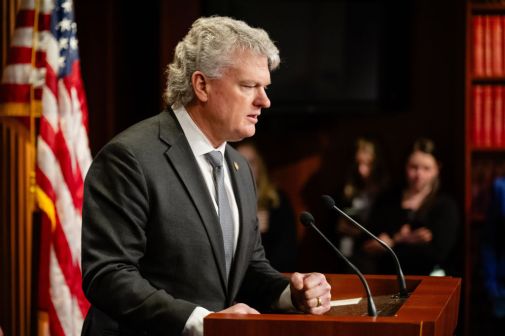USPTO releases AI strategic plan

The U.S. Patent and Trademark Office is planning to examine the intersection of artificial intelligence innovation and advancing intellectual property policies as part of a new AI strategy the agency released Tuesday.
In the document, the USPTO said it intends to study AI-related implications for IP protections and potential uses for the technology to safeguard trademark rights. The agency plans to advocate for the development of “sound judicial precedents and legislation that promote both AI innovation and respect for IP rights, while not unnecessarily constraining future AI innovation.”
USPTO’s strategy also includes plans to advance the agency’s use of computing and data resources, leveraging AI for “increasingly complex use cases” and on high-priority mission requirements that are aligned with the strategic plan.
“USPTO will monitor emerging AI-related IP issues and consider how IP policies and practices can continue to foster both innovations in AI technology and the use of AI to advance other technologies,” the strategic plan states.
The agency said improvements in generative AI could enable systems to “play a greater role in the inventive process, potentially even contributing in ways that resemble human inventors,” which USPTO plans to address by studying patent issues related to the technology and providing guidance and resources to ensure that policies and practices are responsive to developments.
Within trademarks, USPTO said it is looking to study the potential for AI to help brand owners demonstrate the authenticity of goods and services, mitigate counterfeiting and enforce trademark rights. The agency also said it will assess if current laws are sufficiently addressing AI-generated content that mimics an individual’s name, image or likeness and content that replicates proprietary content.
Data ingestion and generated outputs of AI systems have implications for various copyright laws and policy considerations, the agency noted, something it proactively engages with through monitoring relevant litigation in federal courts and weighing in when appropriate. USPTO also said that it has and will continue to provide technical assistance to Congress as lawmakers develop legislation to address these issues.
As UPSTO stays involved in the intersection of AI and IP, the agency also continues to develop and procure AI and AI-enabling technologies as part of its modernization efforts.
The agency reported in its strategic plan that it maintains a suite of on-demand sandbox resources for prototypes and evaluations of AI solutions.
“Accessible testbed environments are critical for agency personnel to experiment with AI and to facilitate early-state AI innovation,” the report states. “Such environments reduce barriers to launching new AI initiatives and encourage broad-based, bottom-up exploration of how AI can help solve business problems.”






